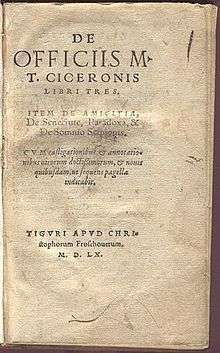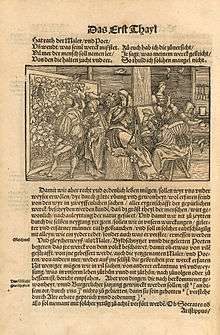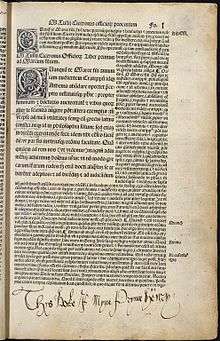De Officiis

De Officiis (On Duties or On Obligations) is a treatise by Marcus Tullius Cicero divided into three books, in which Cicero expounds his conception of the best way to live, behave, and observe moral obligations.
Origin
De Officiis was written in October–November 44 BC, in under four weeks.[1] This was Cicero's last year alive, and he was 62 years of age. Cicero was at this time still active in politics, trying to stop revolutionary forces from taking control of the Roman Republic. Despite his efforts, the republican system failed to revive even upon the assassination of Caesar, and Cicero was himself assassinated shortly thereafter.
The essay was written in the form of a letter to his son with the same name, who studied philosophy in Athens. Judging from its form, it is nonetheless likely that Cicero wrote with a broader audience in mind. The essay was published posthumously.
De Officiis has been characterized as an attempt to define ideals of public behavior.[2] It criticizes the recently overthrown dictator Julius Caesar in several places, and his dictatorship as a whole.
Contents

Although Cicero was influenced by the Academic, Peripatetic, and Stoic schools of Greek philosophy, this work shows the influence of the Stoic philosopher Panaetius.[3][4] The essay discusses what is honorable (Book I), what is expedient or to one's advantage (Book II), and what to do when the honorable and expedient conflict (Book III). Cicero says they are the same and that they only appear to be in conflict. In Book III, Cicero expresses his own ideas.[5] Michael Grant tells us that "Cicero himself seems to have regarded this treatise as his spiritual testament and masterpiece." [6]
Cicero claims that the absence of political rights corrupts moral virtues. Cicero also speaks of a natural law that is said to govern both humans [7] and gods alike.
Cicero urged his son Marcus to follow nature and wisdom, as well as politics, and warned against pleasure and indolence. Cicero's essay relies heavily on anecdotes, much more than his other works, and is written in a more leisurely and less formal style than his other writings, perhaps because he wrote it hastily. Like the satires of Juvenal, Cicero's De Officiis refers frequently to current events of his time.
Legacy
The work's legacy is profound. Although not a Christian work, St. Ambrose in 390 declared it legitimate for the Church to use (along with everything else Cicero, and the equally popular Roman philosopher Seneca, had written). It became the moral authority during the Middle Ages. Of the Church Fathers, St. Augustine, St. Jerome and even more so St. Thomas Aquinas, are known to have been familiar with it.[8] Illustrating its importance, some 700 handwritten copies remain extant in libraries around the world dating back to before the invention of the printing press. Only the Latin grammarian Priscian is better attested to with such handwritten copies, with some 900 remaining extant. Following the invention of the printing press, De Officiis was the second book to be printed—second only to the Gutenberg Bible.[9]
Petrarch, the father of humanism and a leader in the revival of Classical learning, championed Cicero. Several of his works build upon the precepts of De officiis.[10] The Catholic humanist, Erasmus, published his own edition in Paris in 1501. His enthusiasm for this moral treatise is expressed in many works.[10][11] The German humanist, Philip Melanchthon established De officiis in Lutheran humanist schools.[10]

T. W. Baldwin said that "in Shakespeare's day De Officiis was the pinnacle of moral philosophy".[12] Sir Thomas Elyot, in his popular Governour (1531), lists three essential texts for bringing up young gentlemen: Plato's works, Aristotle's Ethics, and De Officiis.[13]
In the 17th century it was a standard text at English schools (Westminster and Eton) and universities (Cambridge and Oxford). It was extensively discussed by Grotius and Pufendorf.[14] Hugo Grotius drew heavily on De officiis in his major work, On the Law of War and Peace.[10] It influenced Robert Sanderson and John Locke.[14]
In the 18th century, Voltaire said of De Officiis "No one will ever write anything more wise".[15] Frederick the Great thought so highly of the book that he asked the scholar Christian Garve to do a new translation of it, even though there had been already two German translations since 1756. Garve's project resulted in 880 additional pages of commentary.
In 1885, the city of Perugia was shaken by the theft of an illuminated manuscript of De Officiis from the city's Library Augusta. The chief librarian Adamo Rossi, a well-known scholar, was originally suspected but exonerated after a lengthy administrative and judicial investigation. The culprit in the theft was never found. Suspicion fell on a janitor who a few years later became well-to-do enough to build for himself a fine house. The former janitor's house was nicknamed "Villa Cicero" by residents of Perugia.
De Officiis continues to be one of the most popular of Cicero's works because of its style, and because of its depiction of Roman political life under the Republic.
Quotes
- ...and brave he surely cannot possibly be that counts pain the supreme evil, nor temperate he that holds pleasure to be the supreme good. (Latin: fortis vero dolorem summum malum iudicans aut temperans voluptatem summum bonum statuens esse certe nullo modo potest) (I, 5)
- We are not born, we do not live for ourselves alone; our country, our friends, have a share in us. (Latin: non nobis solum nati sumus ortusque nostri partem patria vindicat, partem amici) (I, 22)
- Let us remember that justice must be observed even to the lowest. (Latin: Meminerimus autem etiam adversus infimos iustitiam esse servandam) (I, 41)
- Let arms yield to the toga, the laurel defer to praise. (Latin: cedant arma togae concedat laurea laudi) (I, 77)
- It is the function of justice not to do wrong to one's fellow-men; of considerateness, not to wound their feelings; and in this the essence of propriety is best seen. (Latin: Iustitiae partes sunt non violare homines, verecundiae non offendere, in quo maxime vis perspicitur decori) (I, 99)
- Is anyone unaware that Fortune plays a major role in both success and failure? (Latin: Magnam vim esse in fortuna in utramque partem, vel secundas ad res vel adversas, quis ignorat?) (II, 19)
- Of evils choose the least. (Latin: Primum, minima de malis.) (III, 102)
Resources and further reading
- Why Cicero's De Officiis? By Ben R. Schneider, Jr. Professor Emeritus of English at Lawrence University.
- Atkins, E. M.; Cicero, Marcus Tullius; Griffin, M. T., Cicero: On Duties (Cambridge Texts in the History of Political Thought), Cambridge University Press (February 21, 1991).
- Cicero, Marcus Tullius; Grant, Michael, "Selected Works", Penguin Classics (September 30, 1960).
- Cicero, Marcus Tullius; Miller, Walter, "On Duties", Loeb Classical Library No. 30 (January 1, 1913)
- Cicero; Walsh, P. G., On Obligations, Oxford University Press (January 18, 2001).
- Dyck, Andrew R., A Commentary on Cicero, De Officiis, Ann Arbor, The University of Michigan Press, 1996.
- Nelson, N. E., Cicero's De Officiis in Christian Thought, University of Michigan Studies in Language and Literature 10 (1933).
- Newton, Benjamin Patrick, Marcus Tullius Cicero: On Duties (Agora Editions), Cornell University Press (September 6, 2016).
References
- ↑ Marcus Tullius Cicero and P. G. Walsh. On Obligations. 2001, page ix
- ↑ Marcus Tullius Cicero and P. G. Walsh. On Obligations. 2001, page xxx
- ↑ E.M.Atkins: Cicero: On Duties, p.xix
- ↑ Cicero, Miller: On Duty, Introduction
- ↑ Cicero, Grant: "Selected Works", p.157
- ↑ Cicero, Grant: "Selected Works", p.158
- ↑ E.M.Atkins: Cicero: On Duties, p.xxvi
- ↑ Hannis Taylor, Cicero: A Sketch of His Life and Works, A. C. McCLURG & CO. 1916, pp. 9
- ↑ Grafton, Anthony et al. "The Classical Tradition", Belknap Press, 2010, ISBN 978-0-674-03572-0 p.142
- 1 2 3 4 Cicero; Walsh: "On Obligations" p.xliii-xliv
- ↑ Erasmus' Epistolae 152
- ↑ T.W.Baldwin, "William Shakspere's Small Latine & lesse Greeke", Vol. 2, University of Illinois Press, 1944, p. 590, Available online
- ↑ Sir Thomas Elyot, The Boke named the Governour, Vol. 1, Kegan Paul, Trench, & Co. 1883 pp. 91-94
- 1 2 John Marshall, "John Locke: Resistance, Religion, and Responsibility", Cambridge University Press, 1994, pp. 162, 164, 299
- ↑ Voltaire, Cicero, Philosophical Dictionary Part 2 Orig. Published 1764
External links
-
 Latin Wikisource has original text related to this article: De officiis
Latin Wikisource has original text related to this article: De officiis - De Officiis in Latin and English at the Perseus Project
- De Officiis – Latin with English translation by Walter Miller (1913) – Loeb Classical Library edition
- De Officiis online in English, translation by Walter Miller (1913)
-
 De Officiis, english translation by Walter Miller public domain audiobook at LibriVox
De Officiis, english translation by Walter Miller public domain audiobook at LibriVox - De Officiis online in Latin at The Latin Library
- De Officiis From the Rare Book and Special Collections Division at the Library of Congress
